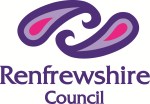Renfrewshire Council - Pilot Report
What happened?
At an early stage Renfrewshire Council identified the importance of senior manager involvement and commitment to the work which would be undertaken. It was decided to utilise an existing group the Best Value Working Group (BVWG) to drive the changes it saw as important and necessary. This group was led by the office of the Chief Executive. Part of this group’s work included key reports to the Council’s Leadership Board (see Good Practice Building Blocks 1 and 2 for the importance of senior level commitment).
An initial baseline study highlighted that although senior officers within the Council had a high level of awareness of equalities and its consideration as part of the decision making process there was less understanding of human rights amongst the workforce in general.
In January 2013 Council officers from across services received training on equality and human rights (see Building Block 3 - Staff, Training and Resources).
Following this training in February 2013 a small core officer group was developed which drew up an Action Plan which identified four areas for development together with associated resource and staffing implications, namely:
-
Developing an integrated equality and human rights impact assessment toolkit.
-
Developing effective communications to raise the awareness, understanding and knowledge of employees on equality and human rights issues.
-
Developing in-house training to increase the capacity of employees to carry out effective assessments.
-
Identifying an area and running a pilot to test the integrated equality and human rights assessment process in practice
Over the next few months work was developed concurrently in these areas.
Developing an integrated equality and human rights impact assessment toolkit
A template to ensure that impact assessment results are reported to Elected Members in a standard format and publicised with Board Reports on the Council website has also been devised and was rolled out from August 2013.
The ‘Equal Opportunities’ implications in the standard Council Board report template was updated to ensure that all decision makers are able to pay due regard to both equality and human rights. The new report template has been used for reports going to policy boards from January 2014.
Developing effective communications to raise the awareness, understanding and knowledge of employees on equality and human rights issues
An awareness raising campaign was commenced from summer 2013. The primary focus of this was to raise awareness of human rights, making more information available for staff on the intranet site and promoting the new guidance. This was an important part of the pilot in that it helped to assure officers of the importance of considering human rights issues when developing policy and re-designing service delivery.
Impact assessment support, information and guidance is being developed for publication on the Council’s website and Renfo. This will be linked to data held on the knowledge hub, ‘Renfrewshire Today’, which is also being developed and will include a wide range of data, consultation results and statistics that give a clear picture about the diverse population of Renfrewshire and the particular service needs and expectations of key groups and communities.
Developing in-house training to increase the capacity of employees to carry out effective assessments
Training was identified as a priority for the authority. In addition to the training delivered in January 2013 additional training on equality and human rights was delivered to those who were to take part during the impact assessment process (see Building Block 3 - Staff, Training and Resources).
As part of this process the authority reviewed its existing equality and human rights training packages and have developed an online resource to support both.
In addition a session specifically tailored for Elected Members in their decision making capacity and ‘scrutiny’ role is being developed. This was intended to help Elected Members keep up to date with equality and human rights issues, and ensure that they are able to assess whether the impact assessment results/information presented to them are sufficiently robust and evidence based in order to pay due regard to equality and human rights.
Identifying an area and running a pilot to test the integrated equality and human rights assessment process in practice
The Council decided to pilot an integrated EQHRIA approach in relation to the review of Advice Services. A small “assessment team” was formed and they developed a staged, timetabled and resourced action plan.
The first step the group identified was the need to conduct desktop research to gather evidence on the overall population of Renfrewshire disaggregated by specific groups and customers in order to establish where gaps in data or understanding existed and the key issues impacting on specific groups and customers. This evidence development produced an extremely thorough analysis of the authority which included measurement of the protected characteristics as well as human rights impacts (see Building Block 6 - evidence gathering).
Specific and focused briefing sessions were then undertaken in September 2013 with a range of frontline and strategic policy officers who were to be involved in undertaking the equalities and human rights impact assessment work. These sessions focused on human rights and equality impacts.
In October 2013, a larger group of key stakeholders took part in a day long workshop where they undertook an equality and human rights impact assessment. This process was independently facilitated and the group considered the recommendations from the Advice Services Review; considered the evidence which had been gathered, assessed the human rights and equality impacts of the Advice Services Review recommendations and identified any area which required changes or mitigation. After the workshop a summary report was produced, findings were passed to the Advice Services Review policy team who made final recommendations to senior managers and elected members for decision making (see Building Block 9 - Conclusions and Recommendations).
Key lessons learned and challenges identified
The Renfrewshire pilot identified some important lessons:
-
It was critical that from the outset there was senior leadership commitment and involvement which fostered a sense of priority and commitment from officers involved; gave focus to the benefits of undertaking an EQHRIA for the delivery of effective services and improved the ability to influence and engender change where it was needed (see Building Block 1 - senior level commitment and engagement).
-
The authority gave significant priority to the process and committed resources both in terms of staffing and to the conduct of consultation events and evidence gathering (see Building Block 5 - What to Assess and Scope).
-
The bespoke training which was delivered served to highlight the importance of human rights and equality in service delivery as well as impact assessment and enabled a more robust consideration of the issues when the impact assessment was being carried out (see Building Block 3 - Staff, Training and Resources).
-
A significant amount of time and resource was expended on developing a robust evidence base to support the EQHRIA. This was quickly seen as having a benefit far beyond the specific project (see Building Block 6 - evidence gathering).
-
The engagement and involvement of community members, affected groups and authority partners not only enriched the evidence gathering process but was critical in the identification of human rights and equality impacts (see Building Block 7 - Involvement of Communities).
-
Gathering a range of informed stakeholders in the one place to undertake the impact assessment helped them to consider the issues from a diverse range of viewpoints. This process also helped to highlight the combined impact of changes upon affected individuals. It also served to highlight how important it is that impact assessments be undertaken with as broad a range of participants as possible (see Building Blocks 3, 5 and 8).
-
Participants reflected that as a result of the pilot they were more comfortable both with recognising the relevance of human rights and its relationship to equality outcomes, but also that the whole process of impact assessment was seen as being beneficial to policy development (see the section on Added Value of human rights).
For more information on the human rights impacts identified see the section on the Added Value of human rights in the pilot areas.






